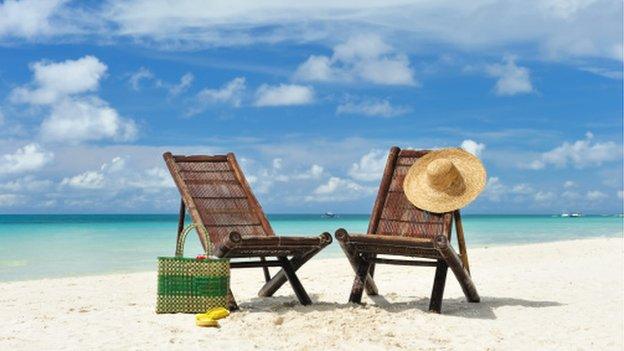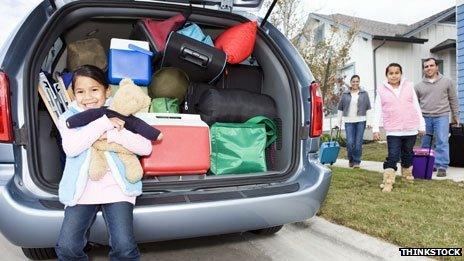You mean you're not on holiday yet?
- Published

If this article is of any interest to teenagers in Estonia or Latvia, it will only be to give them a chance to feel really smug - because their schools are already shut for the summer holidays.
They might be glancing at this on their mobiles on a beach somewhere, just to get a certain sense of satisfaction that they're not stuck reading something even duller in English lessons.
Schools in Sweden, Iceland, Finland and Ireland are also empty - and Bulgaria's primary schools have been closed since the end of May.
And don't feel too sorry for pupils in Italy and Hungary, because they are almost ready for their end-of-year goodbyes.
Instead reserve your sympathy for another group of European countries with many more weeks to tear off the calendar before escaping into the sun.
Liechtenstein keeps going into the first week of July, while classrooms in England and Wales are running a school-year marathon, staying open until the third week of July.
But they are not the very last students in Europe to be stuck inside in summer. That honour is reserved for the Bavarians.
Germany has a six-week break staggered in different regions - and it means that pupils in Bavaria do not break up until the end of July, beginning a holiday that lasts until mid-September.
Here comes the summer
Unfortunately a late start to the holiday is usually no promise of a late return. Quite the opposite.
Those Latvian teenagers, already basking in their summer sojourn, stay off school for 13 weeks. The Italians are tucking into a big slice of the dolce vita with a 12 to 13 week break.
Those freewheeling Bulgarian primary school pupils are going to be out of the classroom until mid-September.
The Finns have 10 to 11 weeks off in the summer, Iceland, Portugal, Spain and Ireland have 12 weeks, Norway and Poland about eight weeks.
The length of a summer holiday seems to defy any clear geographical or cultural pattern. It's not a case of the southern European countries taking the academic equivalent of a siesta.
There are even big differences within countries. Parts of Switzerland have the shortest holidays, five weeks, while other parts have 10 weeks.
Within the UK, there are different patterns. While England and Wales keep studying deep into July, schools in Scotland have emptied by late June to return in mid-August and in Northern Ireland they finish at the beginning of July for a two-month break.
Rural myth
It's more about tradition and what's come to be expected.
And it's not all about a legacy of an agricultural past. There have been longstanding challenges to the idea that summer holidays were created to allow children to help with the harvest.
Many 19th Century state school systems were driven by the demands of an urban population, rather than rural. In the United States pressure for a longer summer break came from middle-class families wanting to get out of the unhealthy, overheated cities.

Packing it in: Just putting in a few things for the journey
Another theory is that the school holidays followed the pattern of other institutions, such as universities, law courts and private schools.
But is there any connection between the length of the summer holiday and achievement in school?
The evidence once again is inconsistent. Liechtenstein, with only a modest six-week summer break, has the highest maths results in Europe, according to the international Pisa tests run by the Organisation for Economic Co-operation and Development (OECD).
But the best in Europe at reading are youngsters in Finland and Ireland, who have some of the longest summer holidays. Perhaps they spend the time reading. Finnish schools are away from the beginning of June until mid-August and it's even longer in Ireland, where they are on holiday until September.
If pupils are meant to forget everything they've learned over a long summer, then someone has forgotten to tell that to the Estonians, who combine a very long holiday with being among the most successful in both maths and reading tests.
And if long holidays were such a bad thing, why is it that high-achieving private schools often have more weeks off than their state school neighbours?
Counting the weeks
The OECD has its own rather nuanced conclusion. It says there is "some relationship between the time students spend learning in and after school and their performance". But looking across a range of countries and education systems there is "no clear pattern".

A holiday month or still a long way to go?
It means that spending more time in school might help, but again it might not help that much. The quality of teaching and learning is going to be much more important than the quantity.
Of course it's more complicated than counting the weeks off in the summer. There are other holidays during the school year and the length of the school day can vary.
As a more precise measure, the OECD makes comparisons about the average number of lessons in key subjects each year.
In this global ranking, the countries where pupils get the most lessons are Chile, Canada, the United Arab Emirates, Portugal and Singapore.
Again there is no clear link to how well pupils perform in the Pisa tests. Canada and Singapore have lots of lessons and are high achievers - but Portugal, with the most lessons in Europe, does not make the top 30.
Shanghai, the Chinese city which has topped the Pisa rankings, is in ninth place in terms of the volume of lessons, behind countries such as Tunisia and Peru. But where Shanghai really stands out - far above anyone apart from Singapore - is the amount of homework set by teachers.
The UK is ranked 23rd in terms of the amount of lessons each year - exactly the same place as its ranking in the maths test results.
On this global scale, the UK is above average in terms of the number of lessons per pupil each year, while France, Germany, Spain, Ireland, Finland and Poland are all below average.
Whether it counts as first place or last place - they're on holiday so they probably won't care - Bulgaria has the lowest number of lessons each year.